赖世雄初级英语笔记1
赖世雄零起点英语1(入门篇)

读书笔记模板
01 思维导图
03 读书笔记 05 目录分析
目录
02 内容摘要 04 精彩摘录 06 作者介绍
思维导图
关键字分析思维导图
老师
爱好
入门篇
知识
零起点
时间
宾语
零起点
语法
英语 副词
疑问
赖世雄
活用
信
进行时
名词
动词
笔友
内容摘要
很多人想学好英语,却总是事与愿违,其实不是我们学不好,而是英语基础不够扎实。
贴身家教,不出国也能把英语学得棒棒的!
《赖世雄零起点英语》系列由赖世雄老师和吴纪维老师精心编写,
常青藤英语团队细心编辑加工,一共三册,以美语为主,共230课,依次分为入门篇、基础篇、进阶篇。零起点1
是零散的基础语法知识点的介绍,2和3慢慢介入课文的形式,通过文章语境的实例运用进一步巩固前附的语法知
识。是一套由浅入深、循序渐进、图文并茂、内容实用的英语教程,配合讲解音频,句句干货,让学习扎实又有
every day是时间副词,表示“每一天”,是两个词,可以置于句尾或句首;everyday是形容词,表示“每 天的”,是一个词,之后一定要加名词。
字尾如果是t或d时,若与后面的词没有连读,则该t或d要消音。如Paul and David中and的d要消音。
here表示“这里”;there表示“那里”。两者之前都可以接over,用来强调语气,表示“就在”。
Lesson 25 活用 特殊疑问句及一般
问句
Lesson 27 时刻 的说法1
Lesson 28 时刻的 说法2
Lesson 29 活用时 间名词
Lesson 30 介绍现 在进行时
赖世雄经典语法第一章笔记

赖世雄经典语法第一章笔记————————————————————————————————作者:————————————————————————————————日期:第一章句子的形成第一节可做主语的词类1.句子的形式:主语+谓语主语可以省略,即祈使句。
2.主语一般都是名词,包括代词、动名词、不定式短语、名词性从句、名词短语、表示距离的地点副词短语。
3.动词做主语(中文)→动名词or不定式短语(英语)当动名词or不定式短语过长时,用It作形式主语,将动名词改为不定式短语移至句尾。
动名词做主语通常用以表示已知的事实或者曾经做过的经历。
不定式做主语通常用以表示一种意愿、目的或未完成的事。
例外:It is nouse doing sth=It isuseless todosth =It isof no use to dosth =There is nouse/sense/pointin sth.4.句子做主语(中文)→名词性从句(英语)名词性从句包括:that从句、whether从句、疑问词从句(who、what、which疑问代词、where、when、why、how疑问副词)。
一般的句子直接在句首加that。
可以用yes/no回答的疑问句改为whether,be动词以及一般助动词还原。
Doeshe love me?→whetherhe loves me疑问代词若在疑问句中做主语,不用改变结构。
whois she?→who isshe疑问代词引导的疑问句,be动词以及一般助动词还原。
whereis shegoing?→wher esheis going当名词性从句过长时,用It作形式主语,将名词性从句移至句尾。
5.名词性从句可以做主语也可以做宾语或者在be动词之后做表语。
所有的名词性从句都可以做及物动词的宾语。
仅能用whether从句或疑问词引导的名词性从句做介词的宾语,that从句不能做介词的宾语。
6.遇介词非要使用that从句时1.介词+ the fact + that从句2.保留介词→去掉that→that后的主语变成所有格→动词变动名词3.be +adj.+ that从句,即形容词引导的宾语从句。
赖世雄初级美语入门
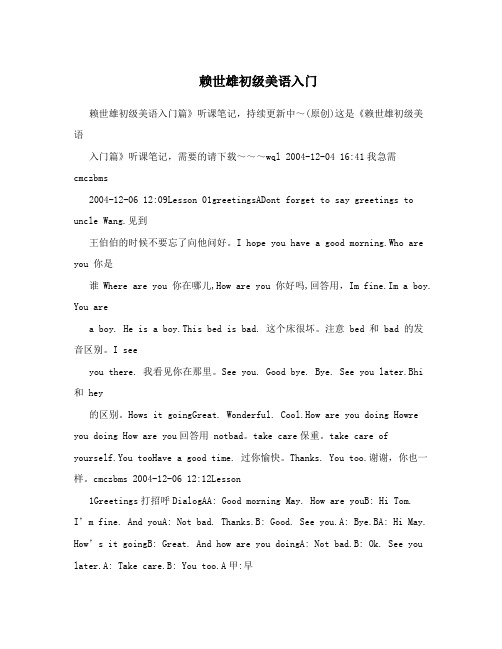
赖世雄初级美语入门赖世雄初级美语入门篇》听课笔记,持续更新中~(原创)这是《赖世雄初级美语入门篇》听课笔记,需要的请下载~~~wql 2004-12-04 16:41我急需cmczbms2004-12-06 12:09Lesson 01greetingsADont forget to say greetings to uncle Wang.见到王伯伯的时候不要忘了向他问好。
I hope you have a good morning.Who are you 你是谁Where are you 你在哪儿,How are you 你好吗,回答用,Im fine.Im a boy. You area boy. He is a boy.This bed is bad. 这个床很坏。
注意 bed 和 bad 的发音区别。
I seeyou there. 我看见你在那里。
See you. Good bye. Bye. See you later.Bhi 和 hey的区别。
Hows it goingGreat. Wonderful. Cool.How are you doing Howre you doing How are you回答用 notbad。
take care保重。
take care of yourself.You tooHave a good time. 过你愉快。
Thanks. You too.谢谢,你也一样。
cmczbms 2004-12-06 12:12Lesson1Greetings打招呼DialogAA: Good morning May. How are youB: Hi Tom.I’m fine. And youA: Not bad. Thanks.B: Good. Se e you.A: Bye.BA: Hi May. How’s it goingB: Great. And how are you doingA: Not bad.B: Ok. See you later.A: Take care.B: You too.A甲:早啊,小梅。
听赖世雄讲座-笔记

第一讲:如何学习英文
3个态度:
1、善用每一分一秒,利用零星时间,超越别人。
2、少就是多,每天学少,但是要巩固,滚动雪球式前进。
3、持之以恒,不断暗示自己。
第一阶段:3个月学习音标。
(每天两三个元音,反复练习,刻意模仿)
第二阶段:学习会话,三个月。
(弄懂每个对话意思,刻意模仿,自己演练对话双方)
第三阶段:大量的阅和读,终身学习。
(英文报纸…一切可阅读的材料,扩展词汇量,语法,写作等)
计划:半年时间里(3月-9月)尽量每天都去学音标、会话(参照美语教程),还要保持听写和泛听。
第二讲:如何练习口语
1、充分利用会话书:正确的声源、搞懂意思、刻意模仿,合上书本一人分演两个角色。
2、描述法,描述周围的环境。
3、翻译法。
第三讲:如何记忆单词
1、凭声音记单词
2、凭句子记单词,会使用单词
3、随时查单词
4、反复练习,克服遗忘
第四讲:如何加强阅读
1、选择适合自己难度的材料。
2、准备笔记本,随时摘抄
3、不查字典草念一遍——精查字典——反复念,不需背——复述故事
第五讲:如何融汇语法
具体看赖氏语法
语法与口语没有冲突,英语的全面能力是建立在语法的基础上
第六讲:如何加强听力
1、发音要纠正,尽量接近母语人士的腔调
2、泛听与精听相结合
第七讲:如何练习写作
1、精确的语法
2、准确使用词汇
3、TDC模式写作。
赖世雄美语入门学习笔记
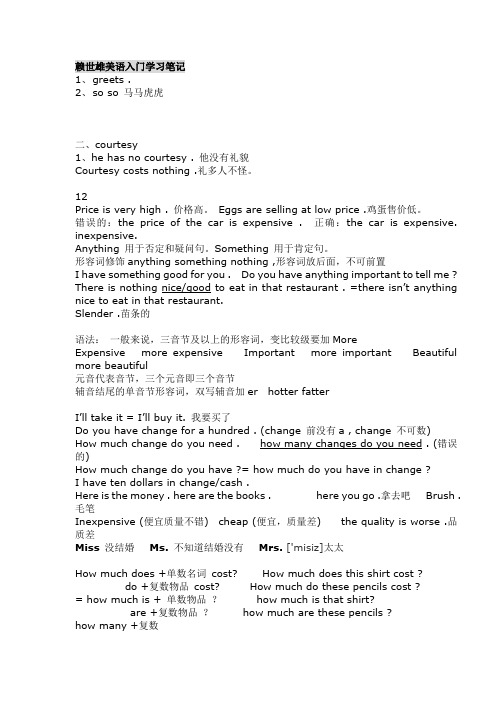
赖世雄美语入门学习笔记1、greets .2、so so 马马虎虎二、courtesy1、he has no courtesy . 他没有礼貌Courtesy costs nothing .礼多人不怪。
12Price is very high . 价格高。
Eggs are selling at low price .鸡蛋售价低。
错误的:the price of the car is expensive . 正确:the car is expensive. inexpensive.Anything 用于否定和疑问句。
Something 用于肯定句。
形容词修饰anything something nothing ,形容词放后面,不可前置I have something good for you . Do you have anything important to tell me ? There is nothing nice/good to eat in that restaurant . =there isn’t anything nice to eat in that restaurant.Slender .苗条的语法:一般来说,三音节及以上的形容词,变比较级要加MoreExpensive more expensive Important more important Beautiful more beautiful元音代表音节,三个元音即三个音节辅音结尾的单音节形容词,双写辅音加er hotter fatterI’ll take it = I’ll buy it. 我要买了Do you have change for a hundred . (change 前没有a , change 不可数) How much change do you need . how many changes do you need . (错误的)How much change do you have ?= how much do you have in change ?I have ten dollars in change/cash .Here is the money . here are the books . here you go .拿去吧Brush .毛笔Inexpensive (便宜质量不错) cheap (便宜,质量差) the quality is worse .品质差Miss没结婚Ms. 不知道结婚没有Mrs.['misiz]太太How much does +单数名词cost? How much does this shirt cost ?do +复数物品cost? How much do these pencils cost ?= how much is + 单数物品?how much is that shirt?are +复数物品?how much are these pencils ?how many +复数13课Hostess 女服务员I’d like to book(reserve) a table for seven. 订桌子(门票通常用reserve)Do you have a table for two ? =do you have a table for two people.有两个人的桌子么May I have the menu .我能看菜单么。
赖世雄初级美语入门

赖世雄初级美语入门赖世雄初级美语入门篇》听课笔记,持续更新中~(原创)这是《赖世雄初级美语入门篇》听课笔记,需要的请下载~~~wql 2004-12-04 16:41我急需cmczbms2004-12-06 12:09Lesson 01greetingsADont forget to say greetings to uncle Wang.见到王伯伯的时候不要忘了向他问好。
I hope you have a good morning.Who are you 你是谁Where are you 你在哪儿,How are you 你好吗,回答用,Im fine.Im a boy. You area boy. He is a boy.This bed is bad. 这个床很坏。
注意 bed 和 bad 的发音区别。
I seeyou there. 我看见你在那里。
See you. Good bye. Bye. See you later.Bhi 和 hey的区别。
Hows it goingGreat. Wonderful. Cool.How are you doing Howre you doing How are you回答用 notbad。
take care保重。
take care of yourself.You tooHave a good time. 过你愉快。
Thanks. You too.谢谢,你也一样。
cmczbms 2004-12-06 12:12Lesson1Greetings打招呼DialogAA: Good morning May. How are youB: Hi Tom.I’m fine. And youA: Not bad. Thanks.B: Good. Se e you.A: Bye.BA: Hi May. How’s it goingB: Great. And how are you doingA: Not bad.B: Ok. See you later.A: Take care.B: You too.A甲:早啊,小梅。
赖世雄教你学语法第一章笔记
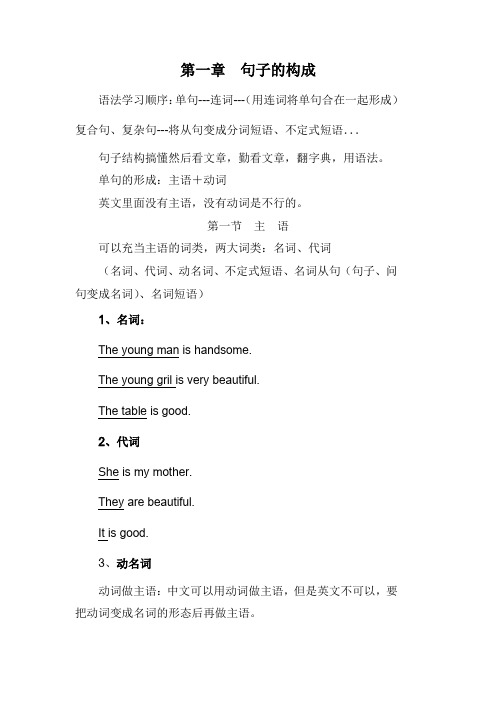
第一章句子的构成语法学习顺序:单句---连词---(用连词将单句合在一起形成)复合句、复杂句---将从句变成分词短语、不定式短语...句子结构搞懂然后看文章,勤看文章,翻字典,用语法。
单句的形成:主语+动词英文里面没有主语,没有动词是不行的。
第一节主语可以充当主语的词类,两大词类:名词、代词(名词、代词、动名词、不定式短语、名词从句(句子、问句变成名词)、名词短语)1、名词:The young man is handsome.The young gril is very beautiful.The table is good.2、代词She is my mother.They are beautiful.It is good.3、动名词动词做主语:中文可以用动词做主语,但是英文不可以,要把动词变成名词的形态后再做主语。
把动词变成的名词叫做动名词。
动名词:动词+ing定义:英语中的动名词是由动词变化而来,它仍一方面保留着动词的某些特征,具有动词的某些变化形式,用以表达名词所不能表达的较为复杂的意念,另一方面动名词在句子的用法及功能与名词类同:在句子可以做主语、宾语、表语、定语。
它也可以被副词修饰或者用来支配宾语。
动名词(做主语):所表示的动作已经做过、有经验、已经事实。
Studying English it is Interesting.Working with him is fine.4、不定式短语to+动词原形to+V原形to---虚词短语---就是两个以上的单词构成的字群。
动名词短语:to go不定式短语:working whit him不定式短语做主语:所表示的动作通常还未做。
未做的事情、目的、梦想、计划、理想用不定式to(做主语)。
To buy something is one of plans.To see him is my purpose.To study abroad is my dream.动名词短语做主语:所表示的动作已经做过、有经验、已经事实。
赖世雄美语从头学初级篇上
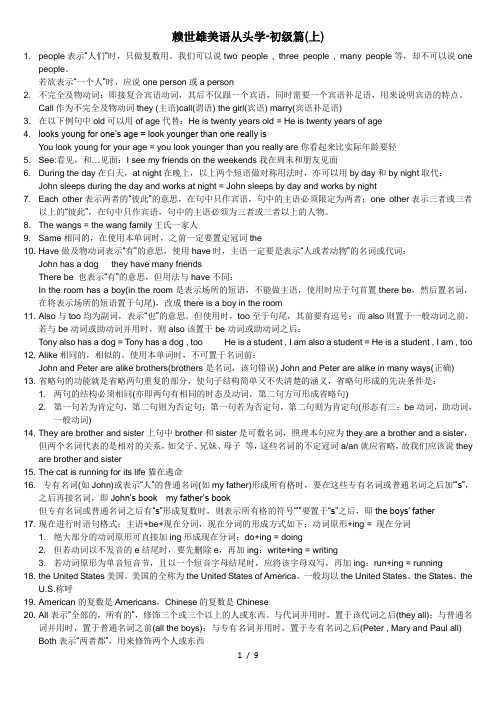
赖世雄美语从头学-初级篇(上)1. people表示“人们”时,只做复数用。
我们可以说two people , three people , many people等,却不可以说onepeople。
若欲表示“一个人”时,应说one person或a person2. 不完全及物动词:即接复合宾语动词,其后不仅跟一个宾语,同时需要一个宾语补足语,用来说明宾语的特点。
Call作为不完全及物动词they (主语)call(谓语) the girl(宾语) marry(宾语补足语)3. 在以下例句中old可以用of age代替:He is twenty years old = He is twenty years of age4. looks young for one’s age = look younger than one really isYou look young for your age = you look younger than you really are你看起来比实际年龄要轻5. See:看见,和…见面:I see my friends on the weekends我在周末和朋友见面6. During the day在白天,at night在晚上,以上两个短语做对称用法时,亦可以用by day和by night取代:John sleeps during the day and works at night = John sleeps by day and works by night7. Each other表示两者的“彼此”的意思,在句中只作宾语,句中的主语必须限定为两者;one other表示三者或三者以上的“彼此”,在句中只作宾语,句中的主语必须为三者或三者以上的人物。
8. The wangs = the wang family王氏一家人9. Same相同的,在使用本单词时,之前一定要置定冠词the10. Have做及物动词表示“有”的意思,使用have时,主语一定要是表示“人或者动物”的名词或代词:John has a dog they have many friendsThere be 也表示“有”的意思,但用法与have不同:In the room has a boy(in the room是表示场所的短语,不能做主语,使用时应于句首置there be,然后置名词,在将表示场所的短语置于句尾),改成there is a boy in the room11. Also与too均为副词,表示“也”的意思。
赖世雄英语学习笔记
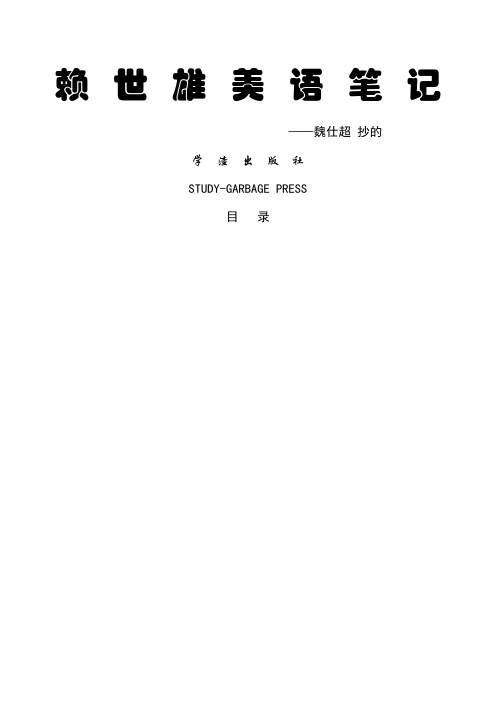
赖世雄美语笔记——魏仕超抄的学渣出版社STUDY-GARBAGE PRESS目录美语入门LESSON 1 greetings词汇:greetings n.问候招呼致意idiom n.短语句子:A:see you later B:alligaterhow are youhow are you doinghow are you getting alonehow have you beenhow's it goingwhat's upwhat's happeningLESSON 2 courtesy词汇:courtesy n.礼貌LESSON 3 what's your name词汇:nationality n.国籍句子:may I have your name please?=what's your name LESSON 4 family name词汇:family name 姓this that these those这个那个这些那些以上为指示代词,也可以有指示形容词的功能,例如this book is goodLESSON 5 how do you do相当于你好,不可以回答I'm fine词汇:occupation n.职业secretary n.秘书pilot n.飞行员句子:how do you do相当于你好,不可以回答I'm fine要说how do you do来回应what do you do你是做什么的LESSON 6 it's five past three词汇:ma'am n.夫人句子:it's five past three=it's three o five三点过五分,十分之后不用加"o"it's twenty to five=it's four fortyLESSON 7月份词汇:January February March April May June July August September October November December句子:June 2 1998这个2不是基数词,是序数词what's today's date今天几月几号LESSON 8 there be句型句子:how's the weather in Beijing=what's the weather like in Beijing 表示“有”句首是人或动物应该使用haveI have a book句首是场所或时间,应该用there is/are在there is/are起首的句型中,应该将there视为固定用语,译成“有”而不要译成“那里是”,若要表示“那里/这里有...”应该说there is.....therethere is a man有个人there has a man 无此用法there is a man there 那里有个人LESSON 9 he's not in句子:he's not in他不在“留话”leave/take messageLESSON 10 can I be of any help for you词汇:clinic n.诊所句子:can I be of any help for you?我能帮您什么?LESSON 11 准备好点单了吗词汇:starve v.饥饿,饿死section n.区域,部门句子:are you ready to ordermay I take your order nowLESSON 13 牛排几分熟词汇:dessert n.甜点steak n.牛排book v.登记well done全熟medium六七分熟medium rare四五分熟rare3分熟LESSON 14 没重点词汇:brand n.品牌on sale 特价pants n.裤子,短裤pair 一条LESSON 15 量尺寸词汇:词汇:gift-wrap包装句子:take one's measurements量一下尺寸give sb. a hand=do sb. a favor帮忙go over there =go thereover用来加强语气表示就在那LESSON 16 one做代词词汇:high heeled n.高跟鞋clerk n.店员句子:one做代词时代替前面出现过的单数名词,ones代替复数名词LESSON 17 查字典词汇:tale n.故事consult v.查询sold out of n.卖完了句子:consult dictionary 查字典look up the word in dictionary 在字典里查词LESSON 18 here we are词汇:domestic n.国内的speed up 加速句子:here we are我们到了here you are/go 在这,拿去there you again 你又来这一套了LESSON 19 how come词汇:twin adj.成双的,双胞胎的rate n.价格费用lobby n.大厅reservation n.预定句子:how come单独用做“怎么回事”句子里how come I didn't know 是说我怎么不知道rate做“价格”时一般用复数what are your rates...LESSON 20 have a reservation强调预定这件事的事实词汇:suite n.套房charge n.记账bellboy n.男服务生句子:have a reservation强调预定事实make a reservation强调预定动作LESSON 21 兑换外币银行说的话词汇:change v.交换n.零钱cash n.现金v.兑换现金currency n.货币change money换钱change A for B把A换成B句子:how do you want your money?兑换外币时银行对顾客说的话,你要兑换多少面值will my passport do? do原意“做”也可以表示“行”“可以”that'll doseven hundreds eight tens and the rest in change此处的rest是代词,代指“其余的”LESSON 22 问生日和介词用法词汇:reconfirm v.再确认confirmation n.确定depart for动身前往某地intend v.打算book in 登记入住句子:date of birth包含年月日,birthday不包含年份表示确切时间介词用at,表示年月季节上午下午晚上时介词用in,表示日期和星期几介词用onLESSON 23 集合名词和arrive in词汇:lounge n.休息室arrival lounge 入境大厅tax n.税aisle n.通道take off 起飞,升空smoking section 吸烟区句子:arrive at后接小地点如邮局车站等arrive in后接大地点如城市国家英文中两个动词在同一个句子时,必须有连词连接,否则为错,但是go和come 以动词原形出现时则可以省略连词and,直接加另一个动词。
(完整word版)赖世雄美语从头学-初级篇(上)

赖世雄美语从头学-初级篇(上)1. people表示“人们”时,只做复数用。
我们可以说two people , three people , many people等,却不可以说one people。
若欲表示“一个人”时,应说one person或a person2. 不完全及物动词:即接复合宾语动词,其后不仅跟一个宾语,同时需要一个宾语补足语,用来说明宾语的特点。
Call作为不完全及物动词they (主语)call(谓语) the girl(宾语) marry(宾语补足语)3. 在以下例句中old可以用of age代替:He is twenty years old = He is twenty years of age4. looks young for one’s age = look younger than one really isYou look young for your age = you look younger than you really are你看起来比实际年龄要轻5. See:看见,和…见面:I see my friends on the weekends我在周末和朋友见面6. During the day在白天,at night在晚上,以上两个短语做对称用法时,亦可以用by day和by night取代:John sleeps during the day and works at night = John sleeps by day and works by night7. Each other表示两者的“彼此”的意思,在句中只作宾语,句中的主语必须限定为两者;one other表示三者或三者以上的“彼此”,在句中只作宾语,句中的主语必须为三者或三者以上的人物。
8. The wangs = the wang family王氏一家人9. Same相同的,在使用本单词时,之前一定要置定冠词the10. Have做及物动词表示“有”的意思,使用have时,主语一定要是表示“人或者动物”的名词或代词:John has a dog they have many friendsThere be 也表示“有”的意思,但用法与have不同:In the room has a boy(in the room是表示场所的短语,不能做主语,使用时应于句首置there be,然后置名词,在将表示场所的短语置于句尾),改成there is a boy in the room11. Also与too均为副词,表示“也”的意思。
赖世雄美语从头学-入门篇
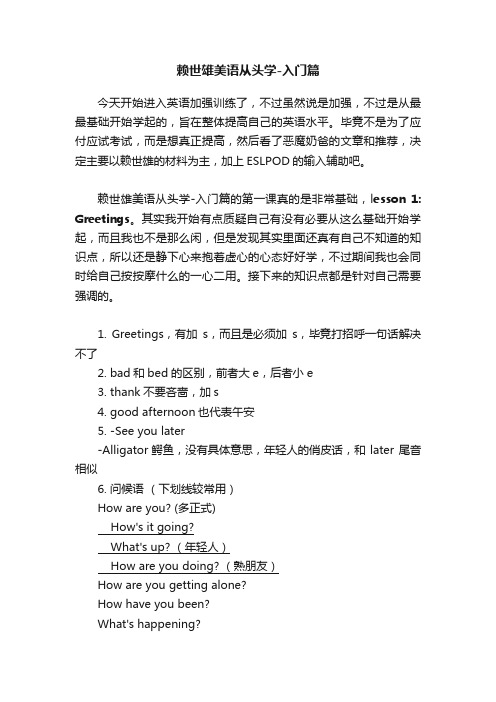
赖世雄美语从头学-入门篇今天开始进入英语加强训练了,不过虽然说是加强,不过是从最最基础开始学起的,旨在整体提高自己的英语水平。
毕竟不是为了应付应试考试,而是想真正提高,然后看了恶魔奶爸的文章和推荐,决定主要以赖世雄的材料为主,加上ESLPOD的输入辅助吧。
赖世雄美语从头学-入门篇的第一课真的是非常基础,lesson 1: Greetings。
其实我开始有点质疑自己有没有必要从这么基础开始学起,而且我也不是那么闲,但是发现其实里面还真有自己不知道的知识点,所以还是静下心来抱着虚心的心态好好学,不过期间我也会同时给自己按按摩什么的一心二用。
接下来的知识点都是针对自己需要强调的。
1. Greetings,有加s,而且是必须加s,毕竟打招呼一句话解决不了2. bad和bed的区别,前者大e,后者小e3. thank不要吝啬,加s4. good afternoon也代表午安5. -See you later-Alligator 鳄鱼,没有具体意思,年轻人的俏皮话,和later尾音相似6. 问候语(下划线较常用)How are you? (多正式)How's it going?What's up? (年轻人)How are you doing? (熟朋友)How are you getting alone?How have you been?What's happening?7. 问候答句区别a. 都有youHow are you?=How are you doing?=How are you getting alone?answer:I'm fine, thank you. (跟fine有关的回答持保留意见,比较多说法是一般不用fine这种回答,我个人听到最多的就是good) Fine, thanks.Great, thanks.Not bad, thanks.So-so, thank you.b. How have you been?这个问法是完成时,所以不能用amanswer:I have been fine, thank you.Fine, thank you.c. How's it going?answer: Not bad, thank you.So-so, thank you.Great, thank you.Fine, thank you.d. What's up/What's happening?answer: Nothing much.Same as usual.8. 感谢Thanks a lot. (非正式)Thanks a million (俏皮话)Lesson 2 Courtesy (礼貌)Idiom: Courtesy costs nothing. 礼貌不花钱;礼多人不怪。
赖世雄初级英语笔记1
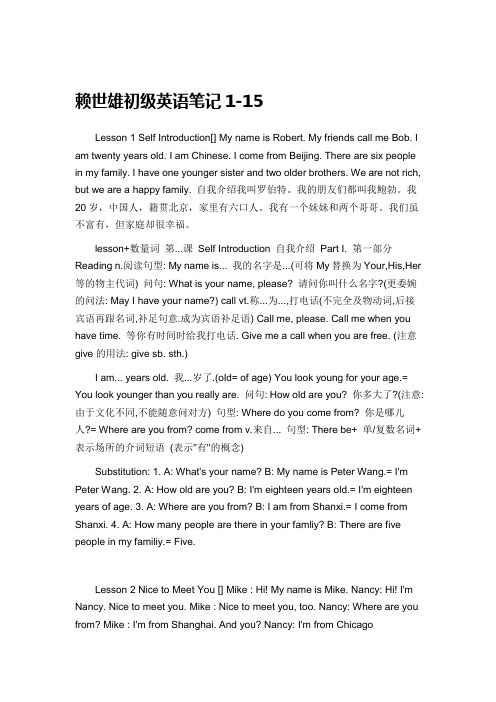
赖世雄初级英语笔记1-15Lesson 1 Self Introduction[] My name is Robert. My friends call me Bob. I am twenty years old. I am Chinese. I come from Beijing. There are six people in my family. I have one younger sister and two older brothers. We are not rich, but we are a happy family. 自我介绍我叫罗伯特。
我的朋友们都叫我鲍勃。
我20岁,中国人,籍贯北京,家里有六口人。
我有一个妹妹和两个哥哥。
我们虽不富有,但家庭却很幸福。
lesson+数量词第...课Self Introduction 自我介绍Part I. 第一部分Reading n.阅读句型: My name is... 我的名字是...(可将My替换为Your,His,Her 等的物主代词) 问句: What is your name, please? 请问你叫什么名字?(更委婉的问法: May I have your name?) call vt.称...为...,打电话(不完全及物动词,后接宾语再跟名词,补足句意.成为宾语补足语) Call me, please. Call me when you have time. 等你有时间时给我打电话. Give me a call when you are free. (注意give的用法: give sb. sth.)I am... years old. 我...岁了.(old= of age) You look young for your age.= You look younger than you really are. 问句: How old are you? 你多大了?(注意:由于文化不同,不能随意问对方) 句型: Where do you come from? 你是哪儿人?= Where are you from? come from v.来自... 句型: There be+ 单/复数名词+ 表示场所的介词短语(表示"有"的概念)Substitution: 1. A: What's your name? B: My name is Peter Wang.= I'm Peter Wang. 2. A: How old are you? B: I'm eighteen years old.= I'm eighteen years of age. 3. A: Where are you from? B: I am from Shanxi.= I come from Shanxi. 4. A: How many people are there in your famliy? B: There are five people in my familiy.= Five.Lesson 2 Nice to Meet You [] Mike : Hi! My name is Mike. Nancy: Hi! I'm Nancy. Nice to meet you. Mike : Nice to meet you, too. Nancy: Where are you from? Mike : I'm from Shanghai. And you? Nancy: I'm from Chicago幸会迈克:嗨!我叫迈克。
赖世雄英语学习笔记

赖世雄美语笔记——魏仕超抄的学渣出版社STUDY-GARBAGE PRESS目录美语入门LESSON 1 greetings词汇:greetings n.问候招呼致意idiom n.短语句子:A:see you later B:alligaterhow are youhow are you doinghow are you getting alonehow have you beenhow's it goingwhat's upwhat's happeningLESSON 2 courtesy词汇:courtesy n.礼貌LESSON 3 what's your name词汇:nationality n.国籍句子:may I have your name please?=what's your name LESSON 4 family name词汇:family name 姓this that these those这个那个这些那些以上为指示代词,也可以有指示形容词的功能,例如this book is goodLESSON 5 how do you do相当于你好,不可以回答I'm fine词汇:occupation n.职业secretary n.秘书pilot n.飞行员句子:how do you do相当于你好,不可以回答I'm fine要说how do you do来回应what do you do你是做什么的LESSON 6 it's five past three词汇:ma'am n.夫人句子:it's five past three=it's three o five三点过五分,十分之后不用加"o"it's twenty to five=it's four fortyLESSON 7月份词汇:January February March April May June July August September October November December句子:June 2 1998这个2不是基数词,是序数词what's today's date今天几月几号LESSON 8 there be句型句子:how's the weather in Beijing=what's the weather like inBeijing表示“有”句首是人或动物应该使用haveI have a book句首是场所或时间,应该用there is/are在there is/are起首的句型中,应该将there视为固定用语,译成“有”而不要译成“那里是”,若要表示“那里/这里有...”应该说there is.....therethere is a man有个人there has a man 无此用法there is a man there 那里有个人LESSON 9 he's not in句子:he's not in他不在“留话”leave/take messageLESSON 10 can I be of any help for you词汇:clinic n.诊所句子:can I be of any help for you?我能帮您什么?LESSON 11 准备好点单了吗词汇:starve v.饥饿,饿死section n.区域,部门句子:are you ready to ordermay I take your order nowLESSON 13 牛排几分熟词汇:dessert n.甜点steak n.牛排book v.登记well done全熟 medium六七分熟 medium rare四五分熟rare3分熟LESSON 14 没重点词汇:brand n.品牌on sale 特价pants n.裤子,短裤pair 一条LESSON 15 量尺寸词汇:词汇:gift-wrap包装句子:take one's measurements量一下尺寸give sb. a hand=do sb. a favor帮忙go over there =go thereover用来加强语气表示就在那LESSON 16 one做代词词汇:high heeled n.高跟鞋clerk n.店员句子:one做代词时代替前面出现过的单数名词,ones代替复数名词LESSON 17 查字典词汇:tale n.故事consult v.查询sold out of n.卖完了句子:consult dictionary 查字典look up the word in dictionary 在字典里查词LESSON 18 here we are词汇:domestic n.国内的speed up 加速句子:here we are我们到了here you are/go 在这,拿去there you again 你又来这一套了LESSON 19 how come词汇:twin adj.成双的,双胞胎的rate n.价格费用lobby n.大厅reservation n.预定句子:how come单独用做“怎么回事”句子里how come I didn't know 是说我怎么不知道rate做“价格”时一般用复数what are your rates...LESSON 20 have a reservation强调预定这件事的事实词汇:suite n.套房charge n.记账bellboy n.男服务生句子:have a reservation强调预定事实make a reservation强调预定动作LESSON 21 兑换外币银行说的话词汇:change v.交换n.零钱cash n.现金v.兑换现金currency n.货币change money换钱change A for B把A换成B句子:how do you want your money?兑换外币时银行对顾客说的话,你要兑换多少面值will my passport do? do原意“做”也可以表示“行”“可以”that'll doseven hundreds eight tens and the rest in change此处的rest是代词,代指“其余的”LESSON 22 问生日和介词用法词汇:reconfirm v.再确认confirmation n.确定depart for动身前往某地intend v.打算book in 登记入住句子:date of birth包含年月日,birthday不包含年份表示确切时间介词用at,表示年月季节上午下午晚上时介词用in,表示日期和星期几介词用onLESSON 23 集合名词和arrive in词汇:lounge n.休息室arrival lounge 入境大厅tax n.税aisle n.通道take off 起飞,升空smoking section 吸烟区句子:arrive at后接小地点如邮局车站等arrive in后接大地点如城市国家英文中两个动词在同一个句子时,必须有连词连接,否则为错,但是go和come 以动词原形出现时则可以省略连词and,直接加另一个动词。
赖世雄初级美语入门篇 第一课,打招呼

第一课,打招呼Lesson One Greetings
见到王伯伯的时候,别忘了向他打个招呼哦,向他问好。
do not forget to see Greetings to Uncle Wang.
两人的对话1 Dialogue A
汤姆:小梅,早啊!T: Good morning Mei!
你好吗?How are you ?
小梅:嗨!汤姆,我还不错啊,那你呢?M: Hi Tom !I'm fine ,and you ?
汤姆:还不赖,谢谢了!T: Not bad thanks.
小梅:好。
再见!M:Good see you!
汤姆:再见!T:Bye !
第一人称:I am
第二人称: You are
第三人称:He is
两人的对话2 Dialogue B
汤姆:嗨,小梅!T: Hi Mei!
近来如何啊?How's it going?
小梅:太棒了!M: Great!
那你呢?好不好啊?And how are you doing ?
汤姆:还不赖。
T: Not bad.
小梅:好,呆会见M: OK see you later.
汤姆:保重T: Take care .
小梅:你也一样M: You too
Hi 是问候的礼貌用语。
Hey 是嘿的意思显得不礼貌。
Great 棒,太棒了。
也可以用cool 棒,棒极了。
how are you doing的缩写为how're you doing 这个缩写不知道是否正确。
赖世雄美语从头学初级篇Lesson 1课文及讲解
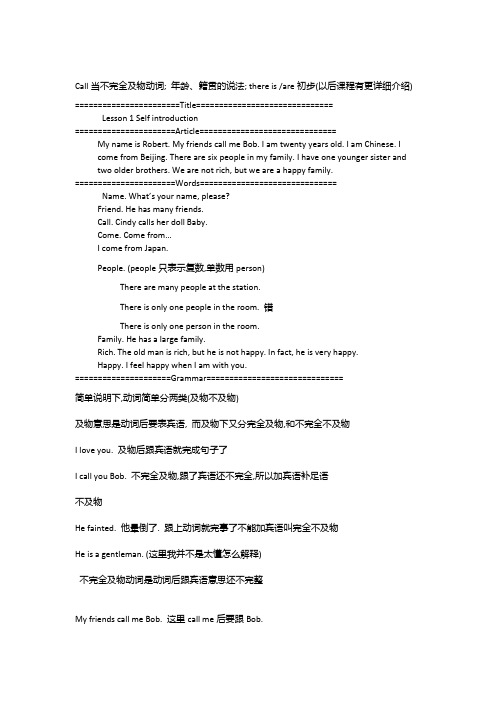
Call当不完全及物动词; 年龄、籍贯的说法; there is /are初步(以后课程有更详细介绍)=======================Title==============================Lesson 1 Self introduction======================Article==============================My name is Robert. My friends call me Bob. I am twenty years old. I am Chinese. Icome from Beijing. There are six people in my family. I have one younger sister and two older brothers. We are not rich, but we are a happy family.======================Words==============================Name. What’s your name, please?Friend. He has many friends.Call. Cindy calls her doll Baby.Come. Come from…I come from Japan.People. (people只表示复数,单数用person)There are many people at the station.There is only one people in the room. 错There is only one person in the room.Family. He has a large family.Rich. The old man is rich, but he is not happy. In fact, he is very happy.Happy. I feel happy when I am with you.=====================Grammar==============================简单说明下,动词简单分两类(及物不及物)及物意思是动词后要表宾语, 而及物下又分完全及物,和不完全不及物I love you. 及物后跟宾语就完成句子了I call you Bob. 不完全及物,跟了宾语还不完全,所以加宾语补足语不及物He fainted. 他晕倒了. 跟上动词就完事了不能加宾语叫完全不及物He is a gentleman. (这里我并不是太懂怎么解释)不完全及物动词是动词后跟宾语意思还不完整My friends call me Bob. 这里call me后要跟Bob.They call the little girl…这里并没有结束后面必须加宾语补足语They call the little girl Mary.I am twenty years old.句子结构为人+be动词+数字+year(s) +old/of age.I am twenty years old.The baby is one year old.He is forty years of age.Age.看起来比实际年轻的用法Look young of one’s age. == Look younger than one really is.You look young of your age. You look younger than you are.He look young of his age. He younger than he really is.I am Chinese. = I am a Chinese.当形容词用不用加a,当名词用要加aThere are six people in my family.这里there are表示有(后面是复数) there同时也是副词”那里”的意思,但后面跟be动词is/are时表示有,以后会说到have这个有的区别Put the book there. 把书放在那里=======================讲解==============================Lesson one self introductionThe lesson is very good. 这一课相当不错Lesson one/two 第一/二课Part one第一部分reading 阅读My name is Robert.My 我的my bicycle我的自行车my home我家Name 名字What's your name, please? 请问你叫什么名字.=what is your name, please?My name is Peter. My name is Robert.please,请,但英美一般放句尾,please前通常放逗号Open the door, please.My friends call me Bob.Friend +s是朋友的复数,2个及以上call除了称某人为...还有打电话的意思Call me, please. 请打电话给我Call me when you have time. 有空给我电话Give me a call when you have time.在这句,call为名词(如果暂时不理解不是很重要)I am twenty years old.I am * year(s) old 我是多少岁,当一岁就用year没有复数,但你一岁也说不出这句. He is one year old.I am twenty years. (那就是我20年,没人理解是什么意思)old不能省,但也可以改用of age.I am twenty years of age.也可以直接I am twenty.How old are you? 你多大年龄,按中文说法就是: you are how old. 英语中疑问词需要放在句首(以后会具体讲)在英美环境,一般男的不能随便问女人年龄I am Chinese.I am a Chinese.这样也行,但不加也可以,一个是名词,一个是形容词(如果暂时不理解没关系) 单数名词要加冠词This is a book. He is a Chinese. Chinese同时也可作形容词. I amChinese.He is an American. 名词He is American.形容词I come from Beijing.come来, from从什么地方I come from Guangdong. He comes from Sichuan.I am from Beijing.也可以Where are you from? 你是哪里人,中文直接翻译是you are from where?但英文疑问词放句首(第二次讲了)Where do you come from? 你是哪里人,这里面有个do先讲一下,以后还会具体讲. come是一般动词,一般动词没办法与主语倒装,be动词才可以your name is what?-- What is your name? come不能直接写成: where come you from? 所以就加助动词do, where do you come from? 如果是be动词的, where are you from?这样可以There are six people in my family.在英文中have ,has是有的意思,但只有那些有生命的东西才能用这个有. In my family has six people.这样是错的,因为家庭不是指某个具体有生命的动物不能用have ,has,另外,in my family,这个由in引导的介词短语不能作主语(暂时记也可以),如果遇到这种介词短语的,那就用there is/are作主语,there are后面跟复数名词桌上有本书,中文本能on the desk has a book.由上可知这是错的,只能改用there is, there are.但这里是单数一本书,就用there is a book one thedesk.房间里有一只猫. There is a cat in the room.There are six people in my family.同理一个人用person.两个人或以上就用peopleOne person,一个人,两个人就用two peopleI have one younger sister and two older brothers.这里有have了,一般用have主语就是有生命的动物I have a book. He has a book. (第三人单数称用has)Younger sister表示妹妹,如果不加就是表示姐妹,可能是姐姐也可能是妹妹,older大的就是哥哥Younger sister, younger brother妹妹,弟弟Older brother哥哥,older sister姐姐We are not rich, but we are a happy family.but是连词,但是的意思rich富有的He is rich.他很有钱He is rich, but he is not happy.他有钱但不快乐.(骗人的,有钱的人都很快乐)======================Practice==============================What's your name?My name is Peter Wang. == I'm peter Wang.How old are you?I'm eighteen years old. == I'm eighteen years of age.Where are you from?I am from Shanxi. == I come from Shanxi.How many people are there in your family? There are five people in my family. == Five.。
《赖世雄初级美语》学习笔记
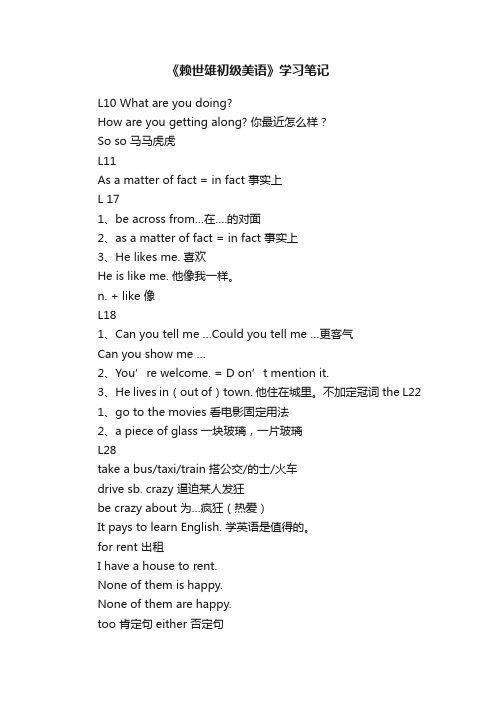
《赖世雄初级美语》学习笔记L10 What are you doing?How are you getting along? 你最近怎么样?So so 马马虎虎L11As a matter of fact = in fact 事实上L 171、be across from…在….的对面2、as a matter of fact = in fact 事实上3、He likes me. 喜欢He is like me. 他像我一样。
n. + like 像L181、Can you tell me …Could you tell me …更客气Can you show me …2、You’re welcome. = D on’t mention it.3、He lives in(out of)town. 他住在城里。
不加定冠词the L221、go to the movies 看电影固定用法2、a piece of glass 一块玻璃,一片玻璃L28take a bus/taxi/train 搭公交/的士/火车drive sb. crazy 逼迫某人发狂be crazy about 为…疯狂(热爱)It pays to learn English. 学英语是值得的。
for rent 出租I have a house to rent.None of them is happy.None of them are happy.too 肯定句either 否定句-ed 感到…. –ing 令人…The baby is tiring. 宝贝(抱着)令人累的。
The baby is tired. 宝贝困了L32Here you are. 拿去吧。
You bet. 别客气。
Don’t mention it. 别客气L33a business suit 西装L34go to the movies 看电影L35little 否定(不可数)没有多少 a little 肯定(不可数)有一些few 否定(可数)没有几个 a few 肯定(可数)有几个only a little = little only a few = fewmuch 通常用在否定句中(不可数)a lot of 用在肯定句(可数或不可数)many 肯定、否定都行(可数)drink 可数many drinks 饮料have a drinkat first … but laterL43if you don’t study, you can’t get anywhere.He is ill in hospital.in hospital 住院[英]in the hospital 在医院里,住院[美]ought to = shouldmay 很可能might 也许angry with sb.angry about/at sth.L44as a matter of fact = in factThere must be something wrong with her. 她一定出事了。
赖世雄美语笔记
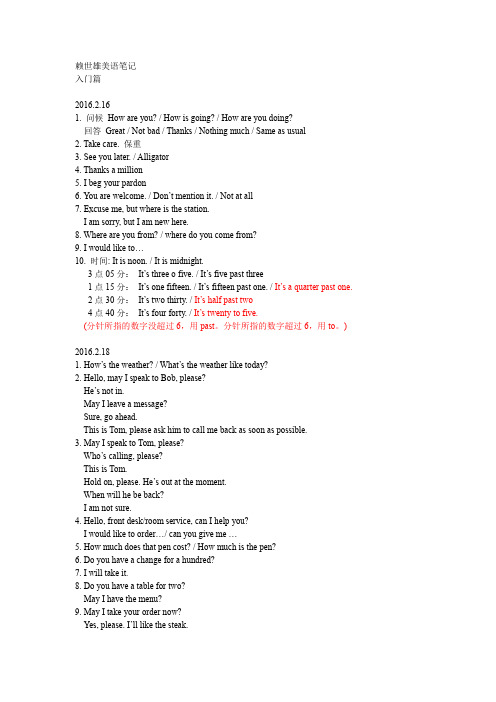
赖世雄美语笔记入门篇2016.2.161. 问候How are you? / How is going? / How are you doing?回答Great / Not bad / Thanks / Nothing much / Same as usual2. Take care. 保重3. See you later. / Alligator4. Thanks a million5. I beg your pardon6. You are welcome. / Don’t mention it. / Not at all7. Excuse me, but where is the station.I am sorry, but I am new here.8. Where are you from? / where do you come from?9. I would like to…10.时间: It is noon. / It is midnight.3点05分:It’s three o five. / It’s five past three1点15分:It’s one fifteen. / It’s fifteen past one. / It’s a quarter past one.2点30分:It’s two thirty. / It’s half past two4点40分:It’s four forty. /It’s twenty to five.(分针所指的数字没超过6,用past。
分针所指的数字超过6,用to。
)2016.2.181. How’s the weather? / What’s the weather like today?2. Hello, may I speak to Bob, please?He’s not in.May I leave a message?Sure, go ahead.This is Tom, please ask him to call me back as soon as possible.3. May I speak to Tom, please?Who’s calling, please?This is Tom.Hold on, please. He’s out at the moment.When will he be back?I am not sure.4. Hello, front desk/room service, can I help you?I would like to order…/ can you give me …5. How much does that pen cost? / How much is the pen?6. Do you have a change for a hundred?7. I will take it.8. Do you have a table for two?May I have the menu?9. May I take your order now?Yes, please. I’ll like the steak.How would you like it?Well-done, please.Medium/ medium rare / rareWould you like some dessert?No thanks.How about something to drink?10. I would like to book/reserve a table for ten.11. Can I have the window seat?12. Can I have a look at that jacket?What size do you wear?Can I try it on?I am looking for a sweater.Any special brand.It’s on sale.2016.2.221.What can I do for?2.Can you do me a favor? / can you help me ? / can you do me a hand?3.In the corner / on the corner/ around the corner4.Do you have these shoes in size 8?5.How much do I owe you?6.Take the change.7.I have a reservation for a suite.8.Do you pay by cash or charge?9.What’s the change rate for US dollars?Which currency do you want to change your money into ?Hong Kong dollars.It’s 7.89 Hong Kong dollars to 1US dollars.Can you change US 100 dollars?How do you want your money?Seven hundreds, eight tens, and the rest in change.10.I’d like to book a flight to Rome. / I’d like to reserve a round-trip ticket to Paris.11.Which class? First class, business, or economy?12.Date of departure? /OK. I’ve booked you on flight number 007. It departs at 5.30 pm. Please call back on Friday to reconfirm.13.Arrive longue 入境大厅/ departure longue 处境大厅14.Aisle or window seat?15.Apiece of luggage / a lot of baggage16.Fill out 填写17.。
赖世雄入门笔记1

1 GreetingsPart AA: Good morning, May. How are you? B: Hi, Tom. I'm fine. And you?A: Not bad. Thanks.B: Good. See you.A: Bye.Part BA: Hi, May. How's it going?B: Great. And how are you doing? A: Not bad.B: OK. See you later.A: Take care.B: You, too.Where are you?I am a boy.You are a boy.He is a boy.This bed is bad.This bed is not good. It's bad.I see you there.Hey. What are you doing there?Great/Wonderful/Cool.How are you doing?How're you doing?Take care of yourself.Take care.Have a good time.Thanks. You too.Vocabulary & IdiomsIt's fine today. =It's a fine day today.Hi. It’s fine, isn't it? Yes, it's.What are you doing here? I’m going fishing.Jenifer is good. Peter is bad.How's it going?And how are you doing?Grammar NotesGood morning(中午十二点以前)/Good afternoon/Good evening 见面时用Good night 道别时使用,相当于goodbye.Goodbye/Bye/See you/See you later/See you tomorrow/See you this afternoon/See you tonight/See you ten years later.See you later. Alligator.Alligator ['ælɪgetɚ] n. 短吻鳄(产于美国及中国);短吻鳄皮革;鳄口式工具adj. 鳄鱼般的;鳄鱼皮革的;鳄鱼皮纹的vi. 皱裂;裂开I'm not alligator. I'm human being.How are you? 多用于正式场合* How are you doing? 多用于熟朋友之间,注意发音(How you doing?)How are you getting along?How have you been?* How's it going?* What's up? 多为年轻人所用What's happening?What's up, dude?Dude[dud]n.纨绔子弟,花花公子;<俚>男人,家伙vt.<俚>打扮得讲究或花哨How are you? /How are you doing? /How are you getting along?问句中有you,所以可用I或省略I'm 来回答。
赖世雄讲语法笔记图文稿

赖世雄讲语法笔记集团文件版本号:(M928-T898-M248-WU2669-I2896-DQ586-M1988)S001. 动词作主语:(1)v.+ing:动名词作主语,表示已知的事实或经验,有已经做了的含义。
例:Working with him is a lot of fun.(2)To+v.:不定式作主语,表示意愿,有此动作还没有做的含义。
例:To study abroad is my goal.代词作主语,例:it主语太长的情况下,用it做代主语,原主语放在最后。
但注意,动名词需要变成不定式to+v. 例:It is fun to learn english with him.注意:It is no use + 动名词,It is useless + 不定式,It is of no use + 不定式,There is no use/sense/point + in + 动名词短语句子做主语,则前面需加That,变成名词从句。
名词从句有三种:代词,whether,疑问句代词:That he loves me is ture.Whether:如果用yes,no回答的时候,这时候主语是句子,则前面加whether。
例:Is she beautiful 变成Whether she is beautiful Whether she is beautiful remains to be seen.S002.疑问句:Where is he going 变成Where he is going is still a mystery。
疑问词保留,但后面变为正常句式。
动词短语作主语:疑问词+不定式,where to go,how to do但注意why不可以做名词主语。
Why did you cry 变成 Why he cried is something we don't know. 不能是 Why to cry表距离from A to B,时间from A to/till B 的介词短语也可以作主语,1990-2003 用to或者till都可以。
- 1、下载文档前请自行甄别文档内容的完整性,平台不提供额外的编辑、内容补充、找答案等附加服务。
- 2、"仅部分预览"的文档,不可在线预览部分如存在完整性等问题,可反馈申请退款(可完整预览的文档不适用该条件!)。
- 3、如文档侵犯您的权益,请联系客服反馈,我们会尽快为您处理(人工客服工作时间:9:00-18:30)。
赖世雄初级英语笔记1-15.Lesson 1 Self Introduction[] My name is Robert. My friends call me Bob. I am twenty years old. I am Chinese. I come from Beijing. There are six people in my family. I have one younger sister and two older brothers. We are not rich, but we are a happy family. 自我介绍我叫罗伯特。
我的朋友们都叫我鲍勃。
我20岁,中国人,籍贯北京,家里有六口人。
我有一个妹妹和两个哥哥。
我们虽不富有,但家庭却很幸福。
lesson+数量词第...课Self Introduction 自我介绍Part I. 第一部分Reading n.阅读句型: My name is... 我的名字是...(可将My替换为Your,His,Her 等的物主代词) 问句: What is your name, please? 请问你叫什么名字?(更委婉的问法: May I have your name?) call vt.称...为...,打电话(不完全及物动词,后接宾语再跟名词,补足句意.成为宾语补足语) Call me, please. Call me when you have time. 等你有时间时给我打电话. Give me a call when you are free. (注意give的用法: give sb. sth.)I am... years old. 我...岁了.(old= of age) You look young for your age.= You look younger than you really are. 问句: How old are you? 你多大了?(注意:由于文化不同,不能随意问对方) 句型: Where do you come from? 你是哪儿人?= Where are you from? come from v.来自... 句型: There be+ 单/复数名词+ 表示场所的介词短语(表示"有"的概念)Substitution: 1. A: What's your name? B: My name is Peter Wang.= I'm Peter Wang. 2. A: How old are you? B: I'm eighteen years old.= I'm eighteen years of age. 3. A: Where are you from? B: I am from Shanxi.= I come from Shanxi. 4. A: How many people are there in your famliy? B: There are five people in my familiy.= Five.Lesson 2 Nice to Meet You [] Mike : Hi! My name is Mike. Nancy: Hi! I'm Nancy. Nice to meet you. Mike : Nice to meet you, too. Nancy: Where are you from? Mike : I'm from Shanghai. And you? Nancy: I'm from Chicago幸会迈克:嗨!我叫迈克。
南希:嗨!我叫南希。
幸会。
迈克:幸会。
南希:你是什么地方人?,迈克:我是上海人。
你呢? 南希:我是芝加哥人。
dialog n.(=dialogue)会话,对话Hi.= Hello. (打招呼的用于,较随意) How do you do. (初次见面时用,且用于正式场合.回答是,初次见面不可用: Fine 当熟悉时方可.) Nice to meet you.= Glad to meet you. 幸会. too : 用于肯定句中,表示"也"的意思. 否定句中用"either",以后会学到.注意词性的记忆,对于词汇的使用很有帮助. Chicago n.芝加哥(美国中西部一大城市)句型: I'm from... 我是...人. I'm= I am根据个人情况回答下列问题: 1. What do your friends call you? My friends call me Johnny. 2. How old are you? I am twenty-eight years old. 3. Are you Chinese? Yes, I am Chinese. 4. How many peope are there in your family? There are six people in my family. 5. How many brothers and sisters do you have? I have two brothers and one sister. 6. Where are you from? I am from Beijing.Lesson 3 My Family [] My father is a teacher. He works during the day. My mother is a nurse. She works at night. They only see each other on the weekends. My brothers, my sister and I don't work. We are students. Because my parents have to work, we do the housework. But we never complain.我的家人我爸爸是老师。
他白天上班。
妈妈则是护士。
她晚上上班。
他们只有在周末才会碰面。
哥哥、妹妹和我没有上班。
我们都是学生。
因为爸妈要上班,家事都由我们来做。
但我们从不埋怨。
------------- 人称代词: 分为主格,宾格; 还有单复数之分及人称的区别(第一人称,第二人称,第三人称.) 还有所有格的变化, 不熟悉的朋友需要自己参考些资料复习下in the evening 在晚上= at night 在晚上during the day 在白天彼此: 两者之间用each other (pron.) 三者以上用one another (pron.) on the weekends 在周末(加s表示规律,每个周末的意思) have to 必须,不得不complain vi.抱怨Don't complain about life. 不要埋怨人生.Substitution: 1. A: What does your fater do? B: He is a teacher.(farmer, soldier) 2. A: When does he work? B: He works during the day.(during the week/on the weekend)Lesson 4 What Do You Do? [] Tony : What do you do, Jenny? Jenny: I'm a secretary. And you? Tony : I'm a construction worker. Jenny: Do you like your work? Tony : Yes, I do. How about you? Jenny: Well, I want to be an actress 你是做什么的? 托尼:詹妮,你是做什么的? 詹妮:我是秘书。
你呢? 托尼:我是建筑工人。
詹妮:你喜欢你的工作吗? 托尼:是的,喜欢。
你呢? 詹妮:嗯,我想当演员。
Practice makes perfect. 熟能生巧. 句型询问职业: What do you do? 你是做什么的?= What's you occupation? occupation n.职业secretary n.秘书,书记,部长construction n.建筑,结构The buliding is under construction.大厦正在兴建. I can't wait to see her. 我巴不得见她. 句型: Do you like... 你喜欢...吗? How about you? 你呢?/你怎么样?= And you? actress n.女演员actor n.男演员[填空: My father (is) a farmer. I (am) a construction worker. We (are) very busy. We work (during) the week. I (have) a sister. She (is) a student. (My) sister (wants) to be a secretary.Lesson 5 Tony and His Family [] I have a good friend. His name is Tony. He has an older sister. Her name is Tina. Their parents are Mr. and Mrs. Wang. Tony also has a dog. Its name is Rover. The Wangs are my neighbors. We live on the same street. The Wangs are very nice. I am lucky because the Wangs are such good neighbors.托尼和他的家人我有个好朋友。
他叫托尼。
他有个姐姐。
她的名字是蒂娜。
他们的父母是王氏夫妇,托尼还有条狗。
它叫来福。
王家是我的邻居。
我们住在同一条街。
王家人很好。
我很幸运,因为我有王家这么好的邻居。
表示人或是动物"有"的概念时,用have或has. 表示场所"有"的时候,用there be的句构. parent 通常使用时都用复数parents. also,too区别: also用在句中,放在be动词后或动词前; too通常置于句尾. Rover 来福(名) rover n.流浪者its pron.它的it's= it is the wangs= the wang family 王氏一家人I live here(there). 我住在这里(那儿) in the street (指在街道中间)Substitution: 1. I have a good friend. You have a good teacher. She has a strong brother. It has a beautiful tail. They have a beautiful sister. 2. Their parents are Mr. and Mrs. Wang. Our teacher is Mr. Chen. His father is Mr. Lee. Her mother is Mrs. Lin. Its tail is long. 3. We live on the same street. (in the same house\ in the same building\ in the same city)Lesson 6 Is This Your Dog? [] Mrs. Lee: Is this your dog? Tony : Yes, it is. Why? Mrs. Lee: Well, your dog chases my cat. Tony : Oh, I'm sorry. Mrs. Lee: Please keep your dog on a leash. Tony : Yes, ma'am.这是你的狗吗? 李太太:这是你的狗吗? 托尼:是的。
